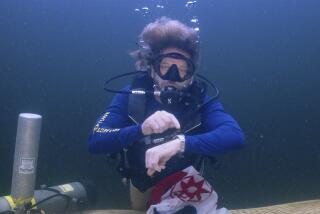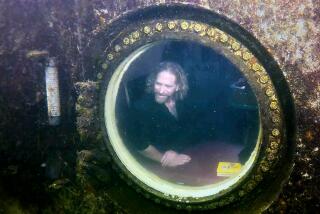HUNTINGTON BEACH : Life Is Adventure in <i> Deep </i> Space for Him
- Share via
As a boy growing up during the height of the space program, Jeffrey Bozanic dreamed of becoming an astronaut.
But, stymied by his large frame and poor eyesight, he turned to exploring the unknown on earth, plunging into underwater cave diving.
Bozanic, 33, for more than a decade has been scuba diving through underwater caves throughout the world, venturing into strange marine terrain few others have dared to seek out.
Next month, the Huntington Beach native will be probing the depths of one of the most remote spots on the planet--beneath the Antarctic ice shelves.
For Bozanic, who today alternates residences between Key Biscayne, Fla., and Huntington Beach, it will be his second diving trip off the desolate continent. In late 1989 and early 1990, he spent five months diving beneath the huge ice cover.
He will return Oct. 1 for another five-month stay, through the Antarctic summer. Bozanic is working under contract for Antarctic Support Associates, which operates under the auspices of the National Science Foundation. He will oversee research diving operations at McMurdo Base, one of three bases on the continent.
Bozanic is among what he estimates as fewer than two dozen professional cave divers in the world. He said every new dive--whether through the caves off the Canary Islands or under the Antarctic ice--poses a challenge that he finds irresistible.
“There aren’t many frontiers left on this planet,” he said. “The places I visit are truly the last frontiers left anywhere, aside from the space program.”
There is always the possibility of stumbling upon previously undiscovered marine life, Bozanic said. He did that four years ago while diving off the Mexican island of Cozumel, when he discovered an unknown species of cave shrimp, later named Agostocaris bozanici .
But such adventures can exact a heavy price. Cave diving is widely known as most hazardous scuba adventure--there have been 400 documented deaths among cave divers, Bozanic said.
Because of the risk, Bozanic said, he shares few details with his family. His mother, Maxine Bozanic, said she does not want to know what her son is up to, “because otherwise I’d be gray by now. I’m not thrilled with this. But it’s his life, so I’ve come to terms with it.”
During his Antarctic visit, Bozanic will coordinate a team of 15 divers, run a medical center for potential diving accidents and don his scuba gear to help gather data. The divers will study feeding and reproductive patterns and nutrient cycles in marine life, as well as sublimation of ice and environmental matters.
After returning in mid-March, Bozanic said, he will take a month off--then return to the southern land of ice.
More to Read
Sign up for Essential California
The most important California stories and recommendations in your inbox every morning.
You may occasionally receive promotional content from the Los Angeles Times.












